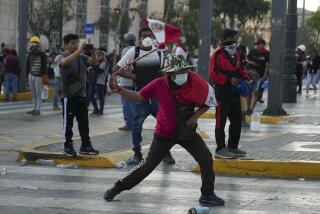Argentina Reports End to Troop Mutiny
- Share via
BUENOS AIRES — The government said Friday that 130 soldiers who mutinied at a military camp in north-central Argentina had surrendered and that their leader, renegade army Maj. Ernesto Barreiro, had fled.
The mutineers were demanding amnesty for officers accused of torture and killing during the so-called “dirty war” against subversion conducted by military governments in the 1970s.
Authorities also said that troops cleared the streets around an infantry school inside the army’s huge Campo de Mayo base in suburban Buenos Aires and cut off the school’s water and electricity after Lt. Col. Aldo Rico, an instructor, was dismissed for inciting cadets to join Barreiro’s mutiny.
Barreiro, 40, was reported to have sought asylum at an unnamed foreign consulate in Cordoba, site of the sprawling 3rd Army Corps headquarters where he had taken refuge Thursday inside the facilities of a paratrooper regiment.
No Casualties Reported
No one was injured in either the rebellion or the surrender, the government said.
Earlier Friday, President Raul Alfonsin put the army on alert and his government prepared a bill for congress that would impose a state of siege, if that proved necessary to cope with the mutiny.
Gen. Hector Rios Erenu, army chief of staff, fired two officers: Lt. Col. Luis Nicolas Polo, in charge of the paratrooper regiment where Barreiro took refuge, and Rico. A government announcement said that eight officers under Rico’s command were arrested while traveling away from their base.
Alfonsin met for several hours with the army’s five top field commanders, and an estimated 100,000 people paraded in the streets of Buenos Aires to show support for Alfonsin and his civilian government. Defense Minister Jose Horacio Jaunarena said this demonstrated “one more time that the people in a clear call want to live under democracy and a state of rights.”
Falklands War
Alfonsin’s inauguration in December, 1983, ended nearly eight years of military rule during which the “dirty war” against Marxist guerrillas was waged and Argentina fought and lost a war with Britain over the Falkland Islands off this country’s coast in the South Atlantic Ocean.
Interior Minister Antonio Troccolo and some legislators asked Alfonsin for a state of siege, which would curtail civil rights for Argentina’s 31 million people.
Alfonsin received proclamations of support in the crisis from several exterior quarters, including the Reagan Administration and President Fidel Castro of Cuba.
“I would like to repeat the U.S. government’s full and unequivocal support of the democratically elected government of Argentina,” State Department spokeswoman Phyllis Oakley declared in Washington.
Human Rights Charges
Barreiro had fled to the paratrooper barracks rather than testify in federal court about atrocities allegedly committed at a military detention camp during military rule.
Human rights groups charge that Barreiro was an officer at the detention camp and that he took part in kidnapings, torture and murder of suspected leftist subversives. It was considered likely that charges would be filed against him.
When Barreiro failed to appear in court, he was declared “in rebellion” and stripped of his rank.
A rebel statement issued from the paratrooper camp demanded amnesty for the about 250 military officers accused of human rights abuses and the resignation of Rios Erenu, the army chief of staff.
More to Read
Sign up for Essential California
The most important California stories and recommendations in your inbox every morning.
You may occasionally receive promotional content from the Los Angeles Times.












